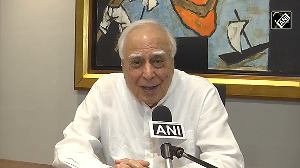 There are two major impact of a "transfer raj". First, criteria other than merit often determine the assignments of bureaucrats to specific positions. So the most important positions may not always go to the most qualified or competent bureaucrats. This naturally means that there are inefficiencies in policy formulation and implementation, Harvard Business School's Lakshmi Iyer tells Faisal Kidwai
There are two major impact of a "transfer raj". First, criteria other than merit often determine the assignments of bureaucrats to specific positions. So the most important positions may not always go to the most qualified or competent bureaucrats. This naturally means that there are inefficiencies in policy formulation and implementation, Harvard Business School's Lakshmi Iyer tells Faisal Kidwai
The appointment of a chief minister leads to a 10 per cent rise in transfer of bureaucrats, says Lakshmi Iyer, associate professor, business administration, Harvard Business School.
Iyer, who has recently conducted an extensive research on transfer of bureaucrats with the University of Warwick's Anandi Mani, says this "transfer raj" means important positions may not always go to the most qualified or competent bureaucrat.
There is a need to limit the power of politicians to transfer, she tells Faisal Kidwai in an email interview.
Why do you think bureaucrats are transferred so regularly in India?
There are several reasons, but one key factor is politics. Politicians in India, particularly state chief ministers, have the ability to transfer bureaucrats across different posts.
In our data analysis, we have identified that the presence of a new chief minister leads to a 10 per cent increase in the transfer probability of an Indian Administrative Service officer. This is mostly because politicians want to appoint specific bureaucrats to specific positions, so that policies are carried out exactly according to their wishes.
This may not necessarily involve corruption or diversion of official funds. In fact, such bureaucrat movements are seen in most countries.
For instance, in the United States, an incoming president gets to appoint the top level bureaucrats in many departments. In India, where politicians cannot hire the bureaucrats, they can nonetheless shuffle them around to accommodate their preferences.
What is the impact of this "transfer raj" on the bureaucracy and society?
There are two major impact of such a "transfer raj". First, criteria other than merit often determine the assignments of bureaucrats to specific positions. So the most important positions may not always go to the most qualified or competent bureaucrats. This naturally means that there are inefficiencies in policy formulation and implementation.
Second, the existence of such a system gives bureaucrats incentives to invest in "non-meritocratic" channels in order to obtain important positions. This could include cultivating close links with specific parties or politicians, or developing a reputation for being "malleable" to a politician's preferences, even if they are not the best policy options for society as a whole.
Finally, there is of course the cost to continuity of administration due to frequent transfers: there are many cases where an officer is transferred before they can finish a project they started, and the project is not continued by their successor.
Additionally, this can discourage officers from starting long-term projects as well.
In your research, you have said that highly skilled officers are less likely to be transferred than loyalists, but you have also said that investment in loyalty rather than expertise is rewarded amply within the Indian bureaucracy. Could you elaborate this point?
Politicians naturally face a tradeoff: ideally they would like to appoint the most competent bureaucrat for a position, but also have him follow through on their own specific wishes as well. Both of these attributes may not be feasible in the same person.
Hence, if the officer's competence is high enough, they will continue to be appointed to good positions even when they do not always follow the politician's policy dictates. Such high-skilled officers are also more likely to retain their posts even if there is a change in the chief minister, since all politicians value competence to some degree.
Officers on the lower levels of competence have a greater incentive to cultivate links to specific politicians so that they can get plum assignments when their "patron" is in power. In this sense, they get great posts some of the time but not-so-great ones the rest of the time.
Among competent officers (who do not invest in cultivating such loyalty), only the very best of them get good positions which they retain through political changes. In this sense, the average quality of job postings is similar across highly-skilled and loyalist officers, but the latter show much greater variance in the importance of their assignments over their career.
Why are so many states opposing the Public Services Bill, the central legislation which aims to help officers perform without interference and fear of persecution for being upright and partial?
Politicians clearly value the power to transfer bureaucrats, as seen by the big increase in transfer probability when a new chief minister comes to power. The Public Services Bill had proposed to limit this power of transfer by specifying, for instance, minimum two-year tenure for district collectors. Transfers before this minimum tenure would have to be justified explicitly by the politician ordering such transfers.
We should note that these recommendations were actually weaker than those put forward by the ministry of personnel and the Fifth Pay Commission, who had both recommended a three-to-five year minimum tenure in most positions.
The opposition to the Public Services Bill further emphasises how much politicians value the ability to appoint bureaucrats of their choice to specific positions.
What should the government do to make bureaucracy more efficient?
While there can be valid justifications for transferring officials (such as not allowing them to become too "cosy" with local interest groups), the "transfer raj" in India has probably become very costly. Some measures like limiting the power of politicians to transfer, instituting minimum tenure lengths, will help.
There can also be other ways to provide incentives for greater competence, such as greater recognition of highly competent officers.
But the biggest change will happen if the elected representatives themselves perceive greater value to providing good administration. If voters strongly reward politicians for efficient and honest administration, politicians will take steps to encourage bureaucratic efficiency.
Image: Lakshmi Iyer







